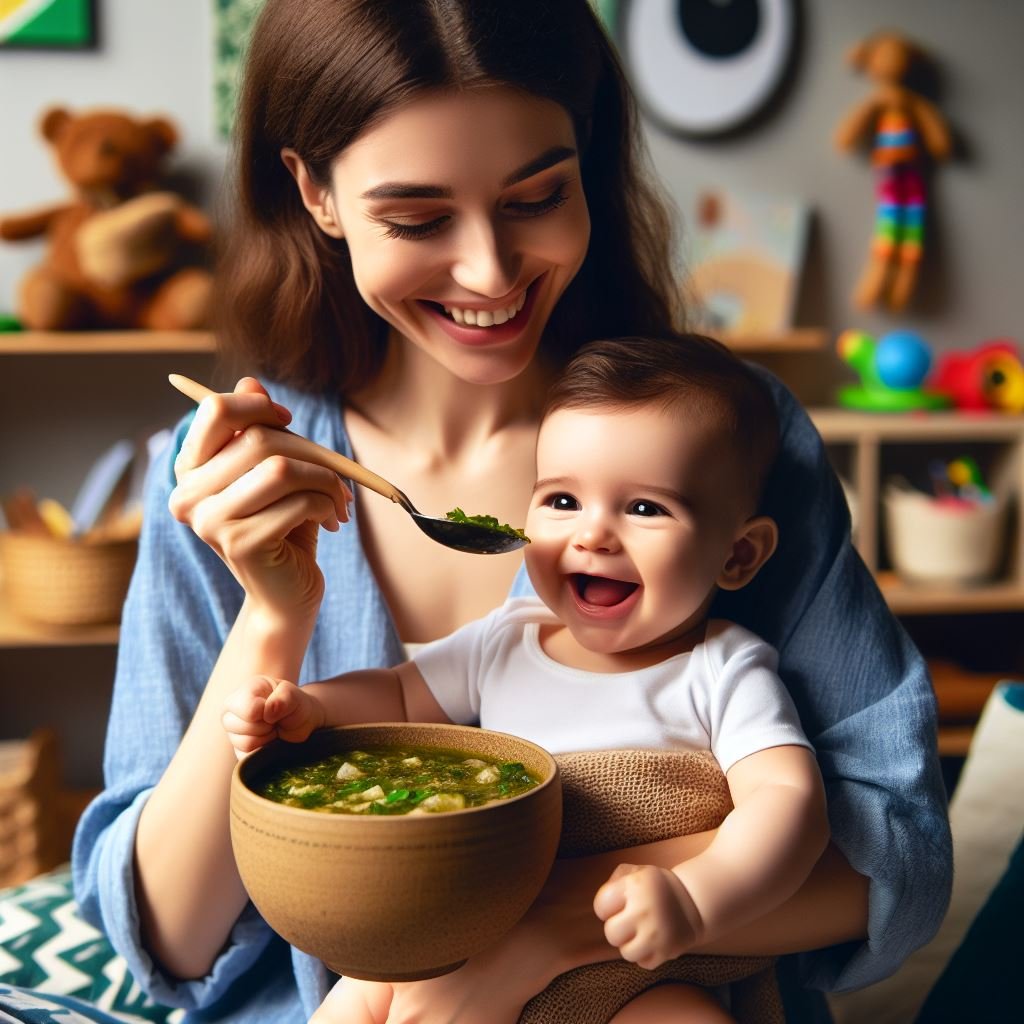Is OKRO Soup Good for Babies ?
In the realm of infant nutrition, the quest for wholesome and beneficial foods never ceases. Just as a caring gardener tends to their plants, parents diligently seek the best ingredients to nourish their little ones.
Today, we explore the merits of OKRO baby soup for babies, delving into its potential nutritional benefits, considerations for introduction, and preparation techniques. As we embark on this culinary journey, let us uncover the secrets of this baby soup and its potential to serve as a nourishing addition to your baby’s diet.
Key Takeaways
- OKRO baby soup is rich in essential vitamins and minerals, including vitamin C and vitamin A.
- It provides dietary fiber, aiding digestion and preventing constipation in babies.
- OKRO baby soup contains minerals like calcium and magnesium, which are important for bone development in infants.
- When introducing OKRO soup to your baby, start with small portions, observe for allergies or sensitivities, and gradually introduce new ingredients.
Nutritional Benefits of OKRO Soup for Babies
The nutritional benefits of OKRO’s soup for babies are numerous and can contribute to their overall health and development. OKRO, also known as lady’s finger or gumbo, is a nutritious vegetable that is rich in essential vitamins, minerals, and dietary fiber. Including OKRO’s baby soup in a baby’s diet can provide them with the necessary nutrients for growth and development.
One of the key nutritional benefits of OKRO soup for babies is its high content of vitamins and minerals. OKRO is a good source of vitamin C, which supports the immune system and helps in the absorption of iron. It also contains vitamin A, which is essential for healthy vision and skin. Additionally, OKRO is rich in minerals such as calcium and magnesium, which are important for bone development and growth.
Furthermore, OKRO soup is a good source of dietary fiber. Fiber aids in digestion and helps prevent constipation in babies. It also promotes a healthy gut microbiome, which is essential for overall gut health and immune function.
Considerations for Introducing OKRO Soup to Your Baby
When introducing OKRO soup to your baby, it is important to consider their individual taste preferences and any potential allergies or sensitivities they may have. Babies have developing taste buds and may have unique preferences when it comes to flavors and textures. Additionally, some babies may have allergies or sensitivities to certain ingredients commonly found in OKRO soup, such as shellfish or fish stock. Therefore, it is crucial to carefully monitor your baby’s reaction when introducing OKRO soup into their diet.
Considerations for introducing OKRO soup to your baby:
- Start with small portions: Begin by offering your baby a small amount of OKRO soup to gauge their reaction. This allows you to observe any adverse reactions or dislikes.
- Observe for allergies or sensitivities: Watch out for any signs of allergies or sensitivities, such as rashes, hives, or digestive issues. If you notice any of these symptoms, consult with your pediatrician before continuing to serve OKRO soup.
- Puree or mash the soup: Depending on your baby’s age and readiness for solids, you may need to puree or mash the OKRO soup to a smooth consistency. This ensures that it is easier for your baby to consume and digest.
- Gradually introduce new ingredients: If you plan to add other ingredients to the OKRO soup, introduce them gradually. This allows you to identify any potential allergies or dislikes your baby may have.
- Serve at an appropriate temperature: Ensure that the OKRO soup is neither too hot nor too cold to prevent any discomfort or burns.
How to Prepare OKRO Soup for Your Baby
To ensure the best quality and nutritional value, it is recommended to use fresh ingredients and follow these steps to prepare OKRO soup for your baby.
Start by gathering the necessary ingredients, which include fresh okra, meat or fish, and other vegetables such as onions, tomatoes, and spinach. Wash all the vegetables thoroughly to remove any dirt or pesticides. Cut the okra into small pieces, ensuring they are soft and easy for your baby to chew.
Next, prepare the meat or fish by boiling it until it is well cooked. Remove any bones and shred the meat into small, bite-sized pieces. In a separate pot, sauté the onions until they are translucent, then add the tomatoes and cook until they soften. Add the okra and cook for a few minutes until it becomes tender.
Once the okra is cooked, add the shredded meat or fish and any other desired vegetables, such as spinach. Stir everything together and let it simmer for a few minutes to allow the flavors to meld.
Potential Risks and Allergies Related to OKRO Soup
Despite its many nutritional benefits, there are potential risks and allergies associated with consuming OKRO soup.
While OKRO is generally safe for most people, it is essential to be aware of possible adverse reactions, especially in babies and individuals with specific allergies or conditions.
Here are some potential risks and allergies related to OKRO soup:
- Allergic reactions: OKRO belongs to the same plant family as cotton and hibiscus, which means individuals with allergies to these plants may also be allergic to OKRO. Common symptoms of an allergic reaction include itching, swelling, hives, difficulty breathing, and, in severe cases, anaphylaxis.
- Oxalate content: OKRO contains oxalates, which can form crystals and lead to kidney stones in some individuals. Those with a history of kidney stones or calcium oxalate disorders should moderate their OKRO consumption.
- Gastrointestinal distress: OKRO is high in fiber, which can cause bloating, gas, and diarrhea in sensitive individuals, including babies with underdeveloped digestive systems.
- Pesticide exposure: If OKRO is not properly washed and cooked, it may contain pesticide residues. Babies and individuals with compromised immune systems are especially vulnerable to the harmful effects of pesticides.
- Contamination risks: OKRO, like any other food, carries the risk of contamination with bacteria or parasites if it is not handled, stored, or prepared hygienically. This can lead to foodborne illnesses, which can be particularly severe in infants and individuals with weakened immune systems.
It is crucial to consult with a pediatrician or healthcare professional before introducing OKRO soup to your baby’s diet, especially if there is a history of allergies or other health concerns. Taking the necessary precautions and being aware of potential risks will ensure the safe consumption of OKRO soup for your little one.
Tips for Introducing OKRO Soup to Your Baby’s Diet
Before introducing OKRO soup to your baby’s diet, it is important to follow these tips for a smooth transition. As caregivers, we understand the importance of providing nutritious and balanced meals to our little ones. OKRO soup, with its rich blend of vegetables and protein, can be a great addition to your baby’s diet.
Here are some tips to help you introduce OKRO soup to your baby:
- Start with a small quantity: Begin by offering your baby a small spoonful of OKRO soup and observe their reaction. Gradually increase the portion size as they show acceptance and tolerance.
- Puree for easier digestion: To make it easier for your baby to consume, puree the OKRO soup until it reaches a smooth consistency. This will ensure that it is easier for their developing digestive system to handle.
- Mix with familiar foods: If your baby is hesitant to try OKRO soup, try mixing it with a familiar food that they enjoy. This can help in easing their transition and acceptance of the new taste and texture.
- Monitor for any adverse reactions: Keep a close eye on your baby for any signs of allergies or intolerances. If you notice any adverse reactions, such as rashes, vomiting, or diarrhea, consult your pediatrician immediately.
Frequently Asked Questions
Can I Feed My Baby OKRO Soup if They Have a Food Allergy?
Feeding a baby with a food allergy requires caution and consultation with a healthcare professional. While okra is generally considered a nutritious food, its suitability for a baby with a food allergy depends on the specific allergen and their individual needs.
How Can I Make OKRO Soup More Appealing to My Baby?
To make okro soup more appealing to your baby, you can try pureeing it to a smoother consistency, adding familiar flavors like mild spices or herbs, and introducing small amounts gradually to gauge their acceptance.
Is It Safe to Add Salt or Spices to OKRO Soup for My Baby?
When considering the safety of adding salt or spices to okro soup for babies, it is essential to prioritize their health and development. Therefore, it is generally recommended to avoid adding salt or spices to baby’s food until they are at least one year old.
Can I Freeze OKRO Soup for Future Use?
Freezing okro soup for future use is a common practice among many individuals. It allows for convenient meal preparation and can help to save time. However, it is important to follow proper food safety guidelines when freezing and thawing the soup.
Are There Any Alternative Vegetables I Can Use Instead of Okra in the Soup for My Baby?
There are alternative vegetables you can use in soup for your baby. Some options include spinach, carrots, and peas. It is important to ensure that the vegetables are cooked well and pureed to a suitable consistency for your baby’s age.
Conclusion
In conclusion, OKRO soup is a nutrient-rich and beneficial addition to a baby’s diet. Its high content of vitamins, minerals, and fiber can support the growth and development of the child.
However, it is important to consider potential risks and allergies before introducing OKRO soup to your baby. By following proper preparation techniques and monitoring for any adverse reactions, OKRO soup can be a delicious and nourishing option for your little one.

